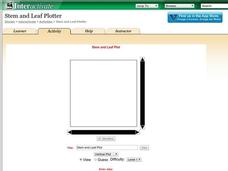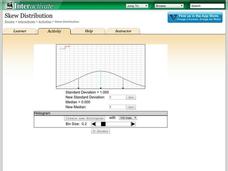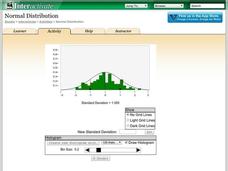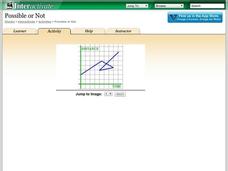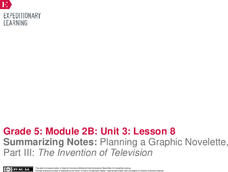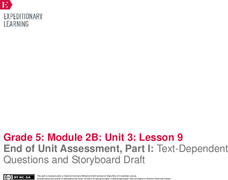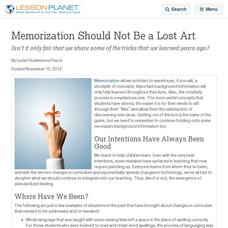Shodor Education Foundation
Squaring the Triangle
Teach budding mathematicians how to square a triangle with an interactive that shows a graphical proof of the Pythagorean Theorem. Pupils alter the lengths of the legs using sliders. Using the inputted lengths, the applet displays the...
Shodor Education Foundation
Pythagorean Explorer
Make sure the measurement is right. The interactive provides right triangles with a missing side measurement. Pupils use the given sides and the Pythagorean Theorem to calculate the length of the missing side. After entering the length,...
Shodor Education Foundation
Stem and Leaf Plotter
The key is in the leaves. Pupils enter data to create a stem-and-leaf plot. The resource then displays the plot and calculates the mean, median, and mode of the data. Using the plot and the calculated measures of spread, learners analyze...
Shodor Education Foundation
Skew Distribution
Slide the class into a skewed view. Learners alter the location of the median relative to the mean of a normal curve to create a skew distribution. They compare the curve to a histogram distribution with the same skewness.
Shodor Education Foundation
Normal Distribution
Does the size of the bin matter? The resource allows pupils to explore the relationship between the normal curve and histograms. Learners view histograms compared to a normal curve with a set standard deviation. Using the interactive,...
Shodor Education Foundation
Multi-Function Data Flyer
Explore different types of functions using an interactive lesson. Learners enter functions and view the accompanying graphs. They can choose to show key features or adjust the scale of the graph.
Shodor Education Foundation
Multiple Linear Regression
You'll have no regrets when you use the perfect lesson to teach regression! An interactive resource has individuals manipulate the slope and y-intercept of a line to match a set of data. Learners practice data sets with both positive and...
Shodor Education Foundation
Possible or Not?
What does the graph mean? Pupils view 10 graphs and determine whether they are possible based on their contexts. The contexts are distance versus time and profit versus time.
EngageNY
Summarizing Notes: Planning a Graphic Novelette, Part II: The Invention of Television
Let's work together! Using the collaborative resource, scholars work in triads to begin section two of their storyboards about Philo Farnsworth, the inventor of the television. They then practice using linking words and phrases to...
EngageNY
Summarizing Notes: Planning a Graphic Novelette, Part III: The Invention of Television
How did the television change people's lives? Learners consider the question as they complete their storyboards about the invention of the TV, adding visual elements along the way. Then, they participate in a peer review to offer and...
EngageNY
End of Unit Assessment, Part II: Storyboard Draft, Sections 2 and 3
It's time to demonstrate knowledge. With the instructive resource, pupils complete the second part of the end of unit assessment. They develop sections two and three of their storyboards about an invention, add visual elements, and then...
EngageNY
End of Unit Assessment, Part III: Storyboard Draft, Section 4
Reflection is the best teacher. Using the resource, scholars complete the final part of their end of unit assessment, the fourth section of their storyboard about an invention. Next, they track their progress using a self-reflection...
EngageNY
Final Performance Task: Presenting Graphic Novelettes
Let's get graphic. Serving as the final performance task of the unit, scholars complete their graphic novelettes and design covers based on their sketches. Finally, they present their hard work to classmates.
EngageNY
End of Unit Assessment, Part 1: Text-Dependent Questions and Storyboard Draft: “You Can Do a Graphic Novel” Excerpt
Eyes on the finish line. Serving as the first part of the end of unit assessment, learners answer questions based on a text about how to write a graphic novel. Using what they've learned, they then create a storyboard about the invention...
EngageNY
End of Unit Assessment, Part 1: Research and Response
Stay on target. The class reviews the learning targets for the unit and the end of unit assessment. Scholars then begin working on part one of the assessment answering how Canada's natural resources meet the needs of the people and how...
Curated OER
Project-Based Learning and the Arts
What's so great about Project-Based learning? Read to learn how projects can help kids apply higher-order thinking skills, conduct thoughtful investigations, and make cross curricular connections. This short article includes five...
Curated OER
Memorization Should Not Be a Lost Art
Isn't it only fair that we share some of the tricks that we learned years ago?
Curated OER
Linking Social Networking to Language Arts
How to tap into students' social networking experiences to enhance learning in the language arts classroom.
Center for Civic Education
Citizenship Schools and Civic Education During the Civil Rights Movement and in the Present
Your young historians will discover the importance that citizenship education has played in the social progress of the United States as they learn about early efforts to discourage African Americans from voting in the 1960s.
Anti-Defamation League
10 Ideas for Teaching Black History Month
Celebrate Black History Month with the help of 10 ideas that delve deep into the history, major events, contributions, famous African Americans, and sheds light on how scholars today can take a proactive stance on current civil rights...
Reed Novel Studies
A Single Shard: Novel Study
Fulfilling a dream requires a lot of hard work. A study guide for the novel A Single Shard shares the dream of a young Korean orphan. As readers work through the guide, they answer comprehension questions about Tree-ear and the...
Curated OER
Reflecting and Creating
Students evaluate the sustainability of an enterprise based on how well it contributes. In this sustainable agriculture lesson plan students build skills as they work together by using the Internet to research and develop their own...
Curated OER
There's a Monster in My E-Mail!
Don't be scared of these monsters! Middle schoolers make new friends as they practice their drawing, writing, and computer skills. They participate in a collaborative e-mail project in which they draw and describe pictures of monsters...
Curated OER
Dinosaur and DNA Days
Biology stars extract DNA samples from beef thymus and then examine its properties. They use enzymes to digest the DNA samples, and then use electrophoresis to separate fragments. Finally, they discuss methods and principles of...


